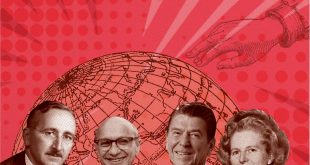Kan Magdalena Andersson släppa den nyliberala modellen? Trots att ingen längre säger sig vara nyliberal, så dominerar de neoklassiska ekonomiska modeller som nobelpristagaren Milton Friedman skapade nyliberalismen av, den verkställda ekonomiska politiken. Det vill säga att ”marknadens” kollektiva visdom är den bärande bjälken som politiken har att förhålla sig till. Inte ens Socialdemokraterna, med finansministern och den sannolika partiledaren Magdalena...
Read More »Was Marx right after all?
Was Marx right after all? .[embedded content]
Read More »Analytical bias
The world is made up of systems. Our body is a system, or in fact a system of systems. What we call “society” is another system of systems, as is the natural environment … But these systems are very complex, difficult to explain or predict. One successful strategy, which has had a revolutionary impact on how we live, is analysis … By biting off chewable portions of a much larger world, science makes it possible to achieve progress in our understanding of how things work...
Read More »Modern macro — ‘genuine plurality’ vs. ‘axiomatic variation’
The DSGE mainstream — which is made up of new classical macroeconomics and neo-Keynesianism — is unanimously based on the core assumptions that characterize the paradigm of social exchange theory. These are rationality, ergodicity and substitutionality, the exclusive acceptance of a formal mathematical-deductive, positivist reductionism. After the ‘empirical turn’ of the last two or three decades, these have been combined with sophisticated micro- and macroeconometrics, or...
Read More »Financialization revisited: the economics and political economy of the vampire squid economy
This paper explores the economics and political economy of financialization using Matt Taibbi’s vampire squid metaphor to characterize it. The paper makes five innovations. First, it focuses on the mechanics of the “vampire squid” process whereby financialization rotates through the economy loading sector balance sheets with debt. Second, it identifies the critical role of government […]
Read More »Levels of aspiration among economists
Levels of aspiration among economists Submission to observed or experimental data is the golden rule which dominates any scientific discipline. Any theory whatever, if it is not verified by empirical evidence, has no scientific value and should be rejected. Maurice Allais Formalistic deductive ‘Glasperlenspiel’ can be very impressive and seductive. But in the realm of science it ought to be considered of little or no value to simply make claims about...
Read More »Keynes was not a Keynesian. He was a Post Keynesian!
Keynes was not a Keynesian. He was a Post Keynesian! But these more recent writers like their predecessors were still dealing with a system in which the amount of the factors employed was given and the other relevant facts were known more or less for certain. This does not mean that they were dealing with a system in which change was ruled out, or even one in which the disappointment of expectation was ruled out. But at any given time facts and expectations...
Read More »Behavioural economics and complexity economics
Behavioural economics and complexity economics What is to take the place of neoclassical economics and its neoliberal policy offshoot? There is no shortage of candidates, grouped under the broad banner of economic heterodoxy. Some of these successor doctrines – behavioral economics and complexity economics are examples of note – take the neoclassical orthodoxies as a point of departure. They therefore continue to define themselves in relation to those...
Read More »Keynes’s Copernican revolution in economics
Keynes’s Copernican revolution in economics .[embedded content]
Read More »A small ray of hope
A small ray of hope I overheard a conversation between two high school students this morning. The first person was asking about which classes the second was going to take next. One of those mentioned was microeconomics. “Oh, that’s easy” said the first, “You just have to remember that it’s all rubbish — they want you to believe that people are rational, and that there’s all this perfection in the world.” “Really?” responded the second, “That’s really dumb....
Read More » Heterodox
Heterodox







